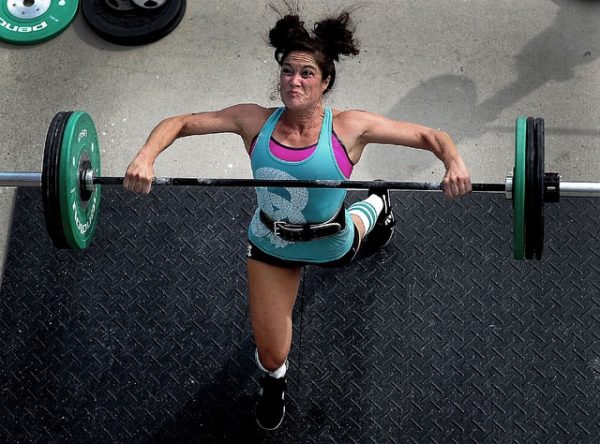I started working out with strength coach Andy Wight because I wanted to be stronger. Smart move, because I am. I also welcome every bit of tone and definition I can get in my arms and the rest of my body — and the effect I hope it’s having on my bones.
My routine includes lifting weights. It gives me so much pleasure to do a trap door deadlift — 65 pounds won’t win me a trophy but it sure is satisfying. So is doing squats holding a 10-pound weight. Some women worry that lifting weights will make them big and bulky. I don’t think I’m in any danger!
But if a woman is really serious about heavy lifting, should she be concerned? If she lifts weights, will she become big and bulky?

skeeze / Pixabay
I asked Andy and also did a bit of online research. Here are some answers.
From Melissa Edmonds, Certified Strength and Conditioning Specialist and contributor to BodyBuilding.com.
“Every time I think this myth has been debunked, it rears its ugly head again. So I’m going to continue repeating this until I stop hearing it around the gym or on the internet: Lifting weights doesn’t make you bulky.
Why not? It’s pretty simple: Women don’t produce nearly enough testosterone to bulk up. In fact, men have 15-20 times more testosterone than women, and it still takes them years of heavy training and proper nutrition to gain muscle. It takes most women even longer.
If you’re new to lifting, you will likely see improvements more quickly than if you’ve been doing it for a while. But don’t worry that your arms and legs will suddenly blow up after a few sets of squats and bicep curls; it’s not going to happen. If you’ve been lifting for 3-6 months and are feeling “bulkier,” I’m afraid it’s probably due to a poor diet and increased body fat, not an increase in muscle size.
That said, you can build whatever physique you desire, and it doesn’t matter what anyone else thinks—as long as you feel good. What one person sees as “bulky” or “too muscular,” another may see as “just right.” What others think about you is irrelevant. You do you!”
From Self Magazine
“It’s pretty hard for women to bulk up from a normal strength-training routine because they don’t have as much testosterone as men (the difference in this hormone level makes men more prone to bulking up). In fact, if weight loss is your goal, strength training can actually help you lean out, but you have to keep your nutrition in check, too. ‘ Muscle is metabolically active,” explains Adam Rosante, C.S.C.S., author of The 30-Second Body. Simply maintaining lean muscle mass requires higher energy, he explains. So, the more lean muscle you have, the more calories your body will burn at rest.”‘
From Active.com
“Considering females have 1/20th to 1/30th of the testosterone levels that men have, this is a false belief.
By lifting more weight, females don’t have the testosterone to support serious muscle mass growth. Now, eating 10,000 calories a day and performing intense strength training workouts will bulk a female up, but that should be avoidable.
People also commonly think the average female doesn’t need to lift heavy weight, but then you see them trying to haul 50-pound bags of dog food in one hand and a full-sized child in the other. Lifting heavy will benefit women in many areas of their lives.”
From Dr. Oz’s personal trainer
“Weight training accounts for 70 percent of your calorie burn. Resistance forces your muscles to work 10 to 20 times more than regular cardio, without bulking. Bulk comes from high-calorie intake, which is why professional bodybuilders consume a lot of calories while lifting a lot of weight. If you combine weight training with a moderate, balanced diet with medium to low-calorie intake, you will burn fat and sculpt your body without adding bulk.”
From Andy Wight, AW Strength & Conditioning.
“The answer I usually give is no. To become big and bulky, there are big factors that come into play such as gender, genetics and training goals. Resistance training will increase muscle size, and it will build lean muscle mass, but it will not make one bulky. In order to become big and bulky, it takes a lot of dedication to a strict training program, years of training, nutrition and many other factors.”


Leave A Comment